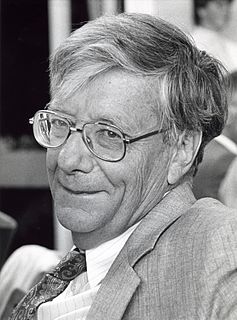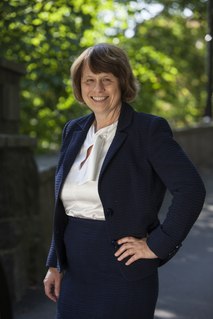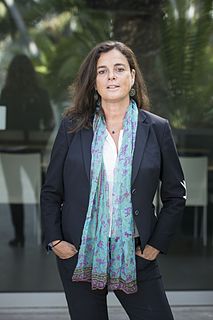
Pieter Zeeman was a Dutch physicist who shared the 1902 Nobel Prize in Physics with Hendrik Lorentz for his discovery of the Zeeman effect.
A national academy is an organizational body, usually operating with state financial support and approval, that co-ordinates scholarly research activities and standards for academic disciplines, most frequently in the sciences but also the humanities. Typically the country's learned societies in individual disciplines will liaise with or be co-ordinated by the national academy. National academies play an important organizational role in academic exchanges and collaborations between countries.

The Royal Netherlands Academy of Arts and Sciences is an organization dedicated to the advancement of science and literature in the Netherlands. The academy is housed in the Trippenhuis in Amsterdam.

Nicolaas "Nico" Bloembergen was a Dutch-American physicist and Nobel laureate, recognized for his work in developing driving principles behind nonlinear optics for laser spectroscopy. During his career, he was a professor at Harvard University and later at the University of Arizona and at Leiden University in 1973.

Pieter Bleeker was a Dutch medical doctor, ichthyologist, and herpetologist. He was famous for the Atlas Ichthyologique des Indes Orientales Néêrlandaises, his monumental work on the fishes of East Asia published between 1862 and 1877.

An academy of sciences is a type of learned society or academy dedicated to sciences that may or may not be state funded. Some state funded academies are tuned into national or royal as a form of honor.

Friedrich Anton Wilhelm Miquel was a Dutch botanist, whose main focus of study was on the flora of the Dutch East Indies.

Ewine Fleur van Dishoeck is a Dutch astronomer and chemist. She is Professor of Molecular Astrophysics at Leiden Observatory, and the president of the International Astronomical Union. She is one of the pioneers of astrochemistry, and her research is aimed at determination of the structure of cosmic objects using their molecular spectra.
Peter, Baron Carmeliet is a Belgian physician and professor at the Katholieke Universiteit Leuven. He is also Adjunct Director of the VIB Vesalius Research Center, KU Leuven. Among his research interests are vasculogenesis, angiogenesis, and vascular endothelial growth factor (VEGF). In 2016, Carmeliet identified neuron-producing stem cells in the brain.
Dr Gordon Howell Orians is an American ornithologist and ecologist. He was the 1999 recipient of the Cooper Ornithological Society’s Loye and Alden Miller Research Award, which is given in recognition of lifetime achievement in ornithological research. He received the Eminent Ecologist Award from the Ecological Society of America in 1998.
Professor Kurt Lambeck AO, FRS, FAA, FRSN is Professor of Geophysics at the Australian National University in Canberra, Australia. He has also taught at University of Paris and at Smithsonian and Harvard Observatories.

Nicolaas Pieneman was a Dutch painter, art collector, lithographer, and sculptor.

Jan Drewes Achenbach is a professor emeritus at Northwestern University. Achenbach was born in the northern region of the Netherlands, in Leeuwarden. He studied aeronautics at Delft University of Technology, which he finished with a M.Sc. degree in 1959. Thereafter, he went to the United States, Stanford University, where he received his Ph.D. degree in 1962. After working for a year as a preceptor at Columbia University, he was then appointed as assistant professor at Northwestern University.

Johannes Carolus (Hans) Clevers is Principal Investigator at the Hubrecht Institute for Developmental Biology and Stem Cell Research (KNAW) and the Princess Máxima Center for Pediatric Oncology, Professor of Molecular Genetics at the UMC Utrecht and Utrecht University, and Oncode Investigator. Clevers was the first to identify living stem cells in the intestine and is one of the world's leading researchers on adult stem cells, their role in cancer and their potential for regenerative therapy. He is also a member of the Board of Directors of the large pharmaceutical company Roche.

Herman Johannes Lam was a Dutch botanist.
The Royal Academy of Science, Letters and Fine Arts of Belgium is the independent learned society of science and arts of the French Community of Belgium. One of Belgium's numerous academies, it is the French-speaking counterpart of the Royal Flemish Academy of Belgium for Science and the Arts. In 2001 both academies founded a joint association for the purpose of promoting science and arts on an international level: The Royal Academies for Science and the Arts of Belgium (RASAB). All three institutions are located in the same building, the Academy Palace in Brussels.

Corinne Lisette Hofman FBA is a Dutch professor of Caribbean Archaeology at Leiden University since 2007. She was a winner of the 2014 Spinoza Prize.

Ineke Sluiter is a Dutch classicist and professor of Greek Language and Literature at Leiden University since 1998. Her research focuses on language, literature, and public discourse in classical antiquity. She was a winner of the 2010 Spinoza Prize. Sluiter has been President of the Royal Netherlands Academy of Arts and Sciences since June 2020, and previously served as Vice President from 2018 to 2020.

Peter Martin Visscher is a Dutch-born Australian geneticist who is professor and chair of Quantitative Genetics at the University of Queensland. He is also a professorial research fellow at the University of Queensland's Institute for Molecular Bioscience and an affiliate professor at their Queensland Brain Institute.
Herman Frans Anna baron Van der Wee is a Belgian economic historian. He was a full professor of social and economic history at the KU Leuven from 1969 to 1993. The academic output of Van der Wee spans economic history, the history of banking, financial history. He has performed research on the period from the Middle Ages to the present time. Geographically he has performed broad research as well, looking into Antwerp, Belgium, the Low Countries, Europe and the world.